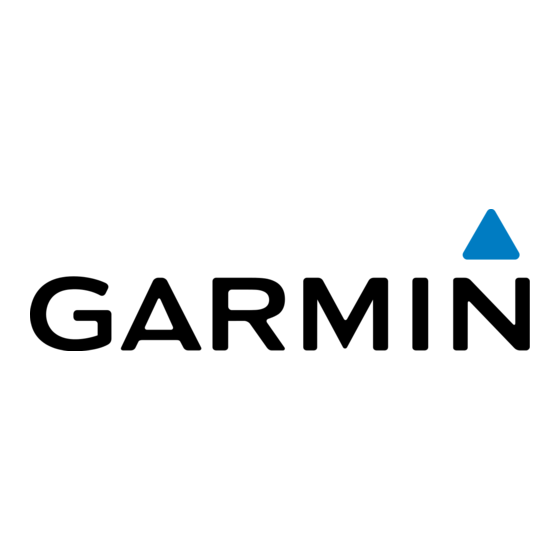- ページ 10
GPS Garmin TT 10のPDF オーナーズマニュアルをオンラインで閲覧またはダウンロードできます。Garmin TT 10 26 ページ。
Garmin TT 10 にも: バッテリー交換方法 (2 ページ), ユーザーマニュアル (5 ページ)

Pausing All Dog Tracking
If you are moving the dogs during a hunt and you do not want to
record the transportation of the dogs, you can pause the
tracking of all of the dogs.
1
Select
.
2
Select
> Pause All Tracking.
Location Alerts
Location alerts notify you when your dogs or contacts enter or
exit a particular location. You can create a custom geofence or
use a radius around your current location.
A geofence is an invisible fence around an area and is created
using points on the map. The virtual boundaries of a geofence
are accurate up to approximately 10 ft. (3 m). Geofences
perform optimally when sized to cover an area encompassing
an average sized backyard (approximately ¼ acre).
Setting a Geofence Alert
You can set up an invisible fence around an area and receive
an alert when a dog or contact enters and exits that area.
1
Select Setup > Location Alerts > Add Alert > Geofence.
2
Select a point on the map, and select Use.
3
Repeat step 2 to define a geofence with up to 10 points.
4
Select Done.
Setting a Radius Alert
You can receive an alert when a dog or contact gets within or
outside of a certain distance away from you.
1
Select Setup > Location Alerts > Add Alert > Radius.
2
Select the unit of measurement.
3
Enter the radius distance, and select
Editing Location Alerts
1
Select Setup > Location Alerts.
2
Select an alert.
3
Select an option:
• Select Disable to turn off notifications for this alert.
• Select Set Alert Type to set the way the device notifies
you for this alert.
• Select Set Alert Mode to set the notification to sound on
exit, entrance, or both.
• Select Delete to remove the alert.
Dog Training
In addition to tracking your dog, the Alpha system can help train
your dog. The Alpha system can both train and track your dog
from up to 9 miles away.
Training information is available at www.garmin.com/alpha. You
should research and investigate the training methods best
suited for you, your dog, and your needs. This manual provides
some basics about training, but you are encouraged to research
more about training.
When used properly, the collar is a very effective training tool to
aid your dog in reaching its full potential. The use of the collar
should be part of an overall training program.
Begin training your dog on a leash, without the collar. You
should train your dog how to heel, sit, and come to you. After
the dog shows a grasp of the concepts of these three basic
commands, you begin training with the collar and the leash.
Finally, when the dog consistently obeys commands using the
leash and collar, you can remove the leash to train with only the
collar.
6
Selecting and Installing the Contact Points
For best results, select the correct contact points based on your
dog's coat.
1
2
3
4
When you put the collar on the dog, make sure that the contact
points are tight against the neck
Removing the Contact Points
When you are not training the dog using the training keys,
remove the contact points.
1
2
Setting Up the Training Keys for One
Intensity Level
Before you can assign the training keys to a dog, you must add
the dog to the handheld device
By default, the training keys are set to the lowest stimulation
setting, with momentary (M), continuous (C), and tone (T) for
each key. This mode is best for when you are training just one
dog. When you train more than one dog, it is helpful to
customize each training key for a dog and intensity level
.
(page
1
2
3
4
5
In this mode, the left key provides momentary simulation. The
center key provides continuous stimulations. The right key
provides a tone.
Customizing the Training Keys
Before you can assign the training keys to a dog, you must add
a dog to the handheld device
You can change the mode of the training keys to customize
each key for a specific stimulation intensity level and for each
dog. This mode is helpful when you are training multiple dogs. If
you are training one dog, it might be easier to only set the
intensity level
1
2
3
4
5
6
7
Select the correct contact point length for your dog's coat
type:
• For dogs with thicker coats, use the longer contact points.
• For dogs with shorter coats, use the shorter contact
points.
If necessary, use the included wrench to remove the contact
points.
Twist the contact points into the collar.
Tighten with the included wrench, but do not overtighten.
Use the included wrench to remove both contact points.
Place the cap over the contact point holes.
6).
Select Setup > Training.
Select the top of the screen.
Select the intensity level for the keys.
If in Traditional stimulation mode, select Lo, Med, or Hi.
Select
.
(page
(page
6).
Select Setup > Training > Training Buttons > Change
Mode.
Select the top of the screen directly under the key you are
customizing.
Select the dog you want to train with this key.
Select an intensity level for the key.
If in Traditional stimulation mode, select Lo, Med, or Hi.
Select momentary (M), continuous (C), or tone (Tone).
Repeat with all three keys.
(page
4).
(page
3).
3).
Dog Training
